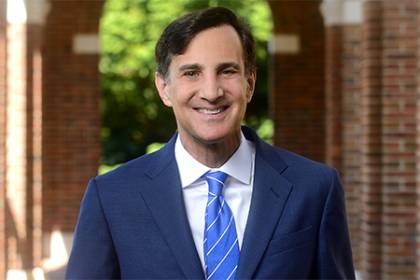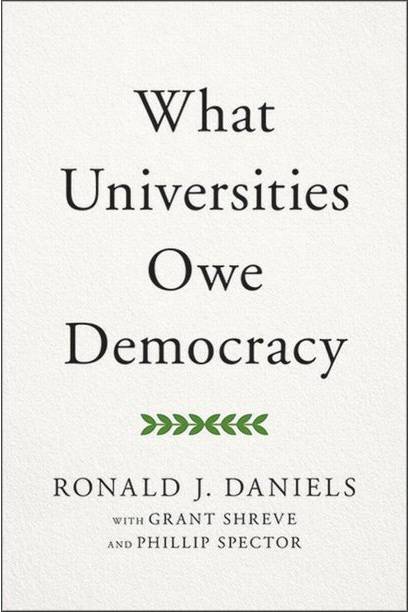With democracy and its institutions more fragile than at any time in decades, Johns Hopkins University President Ron Daniels has authored a new book that critically examines how universities sustain and support democracy. The book, What Universities Owe Democracy, is published by the Johns Hopkins University Press and was released today.

Image caption: Johns Hopkins University President Ronald J. Daniels
A university leader for nearly 30 years and an academic expert in how institutions shape society, Daniels celebrates the indispensable role of universities in democracy while also acknowledging where universities have faltered in this role and outlining an actionable reform agenda.
"The fates of democracy and universities are intertwined. Universities cannot truly thrive under the threat of authoritarian censorship or attack. Such threats stifle thought, inhibit discovery and chill speech," Daniels wrote in an op-ed published last week in The Washington Post.
"But, by the same token, no democracy can prosper without independent universities to forge a bedrock of objective fact, to preserve and interrogate the nation's collective past, to cultivate diverse and pluralistic communities, and to educate students in the skills necessary for active and engaged citizenship."
In What Universities Owe Democracy, Daniels—who teaches undergraduate courses on the relationship between universities and democracy and who has made increasing access for talented students from all backgrounds a signature priority of his Hopkins tenure—identifies four key ways that universities support democracy and in which they must focus their efforts anew:
- Social Mobility: Universities fuel social mobility and opportunity
- Civic Education: Universities can teach young adults the tenets and practices of democratic citizenship
- Facts and Expertise: Universities generate the facts and knowledge that shape public policy and can restore faith in science and expertise
- Pluralism: Universities bring together people from vastly different backgrounds and can model for students how to engage across their differences
What Universities Owe Democracy examines how universities attained these capacities over the past two centuries, where they have fallen short on each, and what policies they might adopt now to sustain and renew their place as a core democratic institution. The reforms Daniels calls for include:
- Ending legacy admissions—a practice Johns Hopkins ended in 2014, a decision about which Daniels wrote in The Atlantic in January 2020.
- Committing to civic education to help future generations become informed and thoughtful democratic citizens.
- Ensuring that the research and insights of university faculty are open and transparent to the public to assure trust in science and facts.
- Modeling for students how to engage with those who have different backgrounds, beliefs, and experiences—the impetus behind Democracy Day, a daylong event during which new Hopkins students are encouraged to think freely and critically about the political world they inhabit and to embrace their responsibilities as citizens.
"Today is an opportunity for all of you to begin exploring some of the problems facing democracies alongside your professors and to ask the hard questions of what must happen for democracies to thrive and flourish in the decades ahead," Daniels told students in August at the university's first Democracy Day.

"There is truly no better place to ask these questions than a university like Johns Hopkins, because it is here that we approach questions with an attitude that is open to dissent, eager to exchange ideas with those who may think differently, and committed to arriving at truth. We are a place … where new ideas are born and refined through contestation, experimentation, and debate."
Universities are at the fault lines of some of the most heated cultural and political debates of this polarized moment. The book's bold prescriptions for how they must act to strengthen democracy are designed to drive conversation both on and off campuses.
What Universities Owe Democracy will be made open access, available for digital download at no cost on the JHU Press website. All proceeds from sales of the book will be returned to Johns Hopkins University Press to fulfill its mission of advancing and disseminating knowledge to the world.
Daniels, who has served as JHU's 14th president since 2009, is the coauthor of two books, Rethinking the Welfare State: The Prospects for Government by Voucher (Routledge, 2005) and Rule of Law Reform and Development: Charting the Fragile Path of Progress (Edward Elgar Publishing, 2008), as well as the coeditor of On Risk and Disaster: Lessons from Hurricane Katrina (University of Pennsylvania Press, 2006).
What Universities Owe Democracy was written with Grant Shreve, a senior writer in Johns Hopkins University's Office of the President, and Phillip Spector, cofounder of the Peter Gruber Rule of Law Clinic at Yale Law School who previously served as the vice president for strategic initiatives at Johns Hopkins University.
Posted in University News
Tagged president ron daniels, democracy








